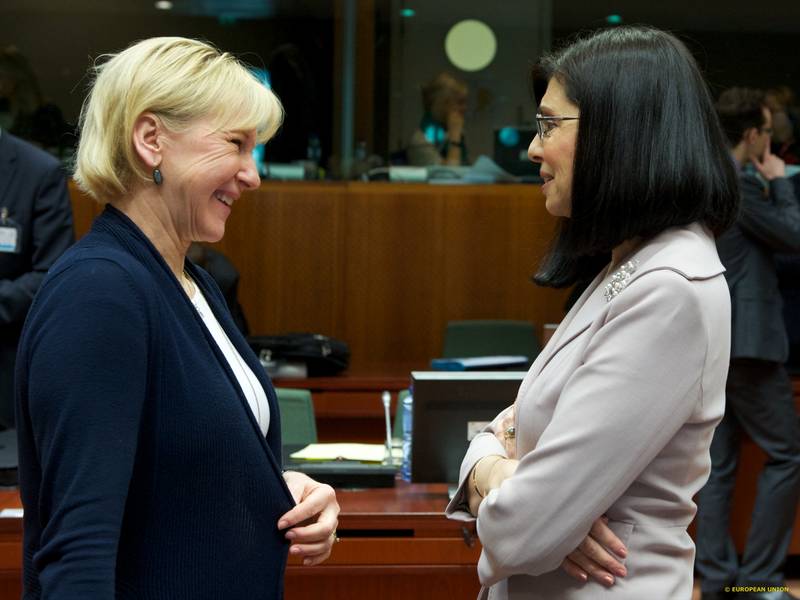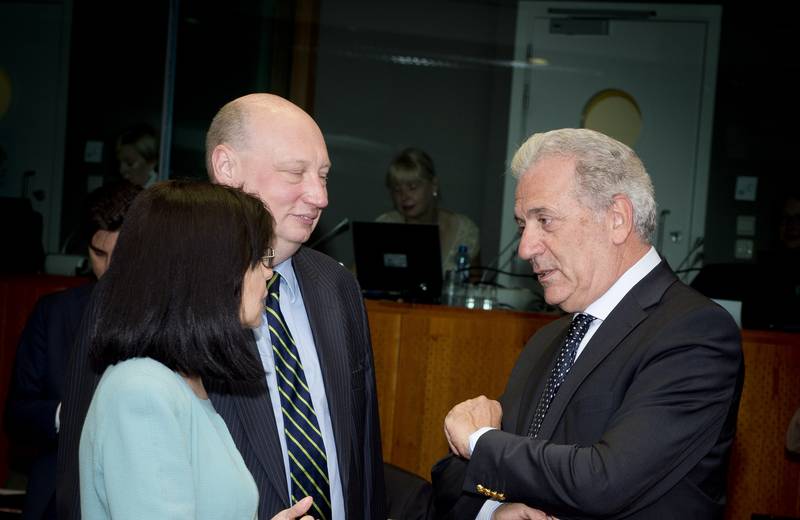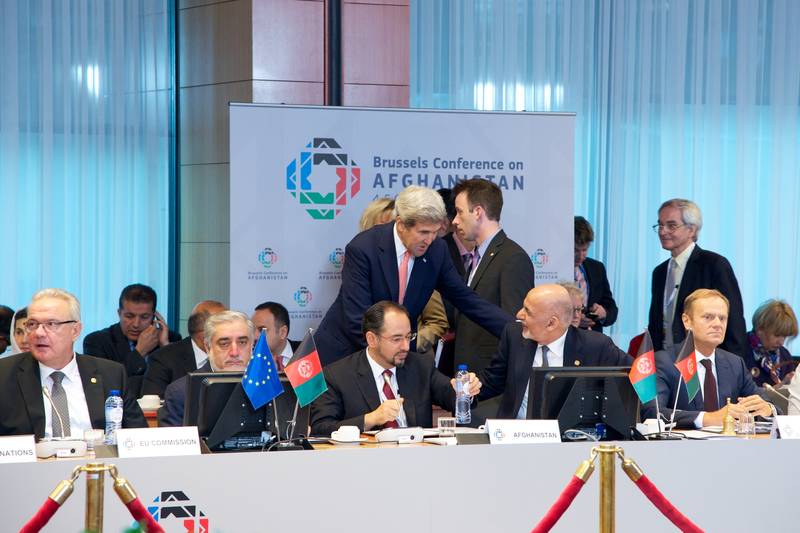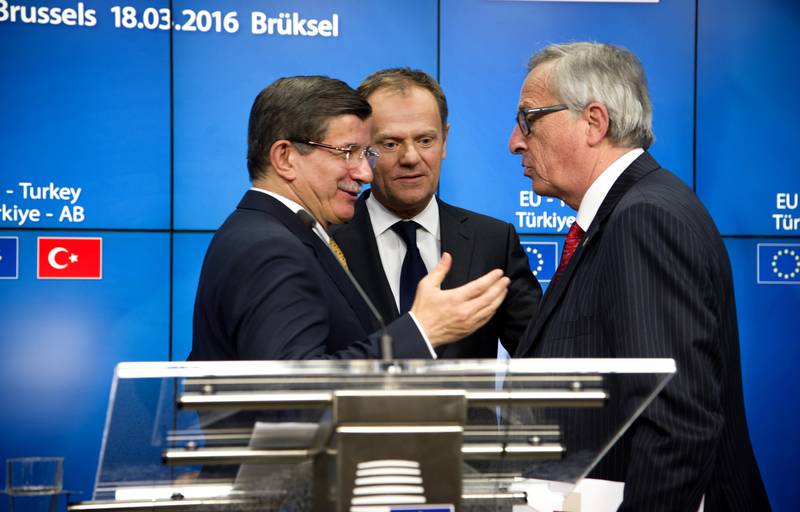Bulgaria: The Permanent Relocation Mechanism Is Not Sustainable
Adelina Marini, September 14, 2015
 Ministers of Home Affairs and Justice are gathering today for an emergency meeting at which they need to agree on the revised proposal of the European Commission on the resettlement of 160 thousand refugees from Italy, Greece, and Hungary. Apart from the temporary solution, the EC proposed last Wednesday in the European Parliament a permanent mandatory relocation mechanism, which however needs more work. To make a distribution decision this mechanism will take into account the number of filed asylum applications over the last six months, as well as the number of illegal entries into a country in question also for the past six months. The ones that would benefit the most from the permanent mechanism are the current “top destinations” for asylum seekers – Germany and Sweden, which have suffered for years from an influx of refugees and migrants.
Ministers of Home Affairs and Justice are gathering today for an emergency meeting at which they need to agree on the revised proposal of the European Commission on the resettlement of 160 thousand refugees from Italy, Greece, and Hungary. Apart from the temporary solution, the EC proposed last Wednesday in the European Parliament a permanent mandatory relocation mechanism, which however needs more work. To make a distribution decision this mechanism will take into account the number of filed asylum applications over the last six months, as well as the number of illegal entries into a country in question also for the past six months. The ones that would benefit the most from the permanent mechanism are the current “top destinations” for asylum seekers – Germany and Sweden, which have suffered for years from an influx of refugees and migrants.
Bulgaria, however, is against the permanent mechanism. This became clear from the state’s official position for the meeting in Brussels today, which is in euinside's possession. The permanent mechanism could be a temporary but not a lasting solution, for the preferences of the relocated individuals are not taken into account. The development of the crisis shows that simple relocation does not work, as it leads to secondary movements and tension among the refugees, while there is no mechanism for controlling secondary movements and there is no way they could be forecasted. Member states cannot stand against the wishes of refugees with a concrete destination – Germany or Sweden. According to the Bulgarian position, the issue is not whether procedures for granting asylum are better in one place than another, it is about standard of living.
A well working and financially backed integration policy is needed. Funds must be provided for a longer period of time, not as a one time sum is Sofia’s position. Moreover, countries of the Western Balkans should be drawn to the common debate on the issues of illegal migration. Their systems of treating migrants should be integrated into a possible common European strategy, says in the position. The new EC proposal also contains a common European list of safe countries of origin for refugees and migrants. In this list are all Western Balkans countries that are not yet EU members and Turkey. The list has been criticised in the European Parliament in a resolution, voted in last Thursday.
Bulgaria's position on accepting more refugees remains unchanged since last week when the state expressed willingness to take in more refugees than in June, when Sofia agreed on a total of 500 people. It is important to note, however, that Bulgaria demands that the refugees' preferences are taken into consideration so their long-term settlement is guaranteed.
We want in Schengen
Along the migrant-refugee crisis Bulgaria strengthened its demand for Schengen membership that has been blocked by several member states with the Netherlands at the lead because of lack of progress in the fight against corruption and organised crime. Deputy PM in charge of European affairs Meglena Kuneva even tied the consent of Bulgaria to accept the EC’s proposal on refugees in exchange for a commitment to remove the blocks to the country’s Schengen membership. Last week she stated that she had coordinated this position with Romania where PM Victor Ponta also said that Romania would open to refugees if the country is accepted in Schengen. The official position of Bulgaria for the emergency meeting of foreign ministers is not formulated as such an ultimatum, but it says that dealing with the refugee crisis would be much facilitated by the joining of Bulgaria and Romania to the Schengen area.
That would make information exchange between member states much easier and would improve the possibilities for dealing with risks, stemming from migration and the refugee flow. Bulgaria does not agree that the refugee wave should be cited as a reason for delaying its accession to Schengen. Now is the time to make decisions that will demonstrate unity between European states, says in the position. The decision on whether the objections to Bulgaria and Romania’s membership are to be lifted is directly related to the joining of Croatia, which recently filed for membership in the Schengen area. The unofficial talk is that regardless of how well prepared  Croatia is it will not be let in before Bulgaria and Romania, which have a right to veto.
Croatia is it will not be let in before Bulgaria and Romania, which have a right to veto.
Meanwhile, in the wake of the ministers’ meeting, Germany temporarily reinstated border control at its border with Austria because of the influx of refugees. Last week, the country opened wide its doors to refugees, provoking strong reactions of approval not only in the EU, but all over the world. On Sunday, however, Vice-Chancellor and Minister of Economy Sigmar Gabriel stated, quoted by Reuters that the lack of European action was forcing Germany to limit its potential for harbouring refugees.
Translated by Stanimir Stoev
 | © Council of the EU
| © Council of the EU Davutoglu, Tusk, Juncker | © Council of the EU
Davutoglu, Tusk, Juncker | © Council of the EU | © Vlada RS
| © Vlada RS